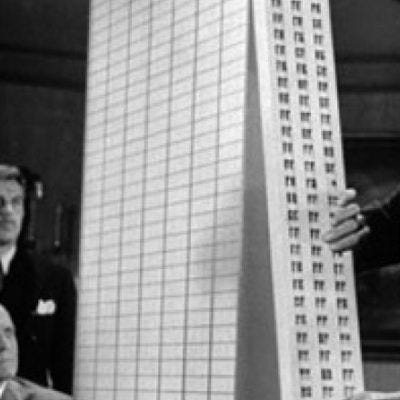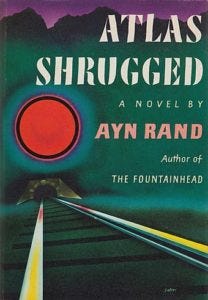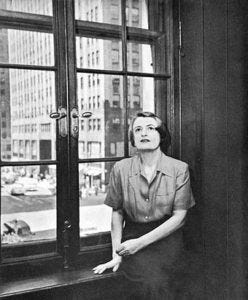Ayn Rand and the Persuasive Power of Popular Culture
Rand used her immensely popular novels to teach millions about free market economics
By James Broughel
Often when you hear a libertarian or a conservative start to say something positive about Ayn Rand, their discussion begins with the words “I’m not an objectivist, but…” By offering this disclaimer upfront, these individuals are signaling they do not endorse some of the more controversial, less socially in vogue aspects of Rand’s philosophy known as objectivism.
While many on the right recognize Rand’s significant literary achievements, including her authorship of the epic novel “Atlas Shrugged” and its predecessor “The Fountainhead,” she is viewed as a crank among academics and philosophers. So, if one doesn’t want to end up alienated from certain high-status social circles, distancing one’s self from Rand is a prerequisite.
However, it may be time to start rethinking Ayn Rand. Not her philosophy necessarily, but the idea that she is somehow little more than a guilty pleasure. I personally hold no strong views about objectivism, Rand’s personal philosophy, which glamorized self-interest as a heroic ideal and rejected virtually all forms of altruism. Many aspects of that philosophy seem basically right to me: our culture should stop making heroes out of airhead Hollywood celebrities and instead elevate the titans of industry.
The first edition of Atlas Shrugged. Image Credit: Wikimedia Commons
Moreover, as an economist, I find it plausible that if people were more rationally self-interested, the world would be a more productive and enlightened place. Being a realist, however, I also recognize that people are emotional, self-deceptive and needy creatures, most of whom could never come close to resembling the heroes in Rand’s novels. Many people, especially those suffering through no fault of their own, deserve our compassion, and, yes, our altruism.
I first read “Atlas Shrugged”—Rand’s epic saga about American industrialists who go on strike to protest the United States drifting towards socialism—in my late 20s. For some people, particularly teenagers, reading this book is a life-changing experience. I’ve certainly read books that changed my life, including in my late 20s, but for me, it was the writings of economists like F.A. Hayek and Milton Friedman, rather than Rand’s novels, that made the difference. Friedman’s book, “Capitalism and Freedom,” in particular, had a huge influence on me. It was the first real exposure I had ever had to free market thinking.
Atlas can be one of those momentous “quake books” that makes people rethink everything they thought they knew, but this was not so for me. Certainly, I enjoyed the book, and I was familiar enough with free market ideas to agree with much of it. But it did not particularly impress me as a work of literature, and frankly, I didn’t give it too much thought after I was done reading it.
In recent months and years, however, my views about “Atlas Shrugged” and Rand’s work in general have begun to shift. I now see her as one of the most important classical liberal thinkers, perhaps exceeding the importance of Milton Friedman, whose influence on the economics profession and me has been profound. Friedman may be the greatest communicator of economics who ever lived. Even now, when I watch old videos of him on YouTube, I am blown away by his cleverness, sense of humor, and the speed with which he could dismantle and destroy any argument. He truly was a remarkable person and economist, and he converted many people – including me – to free market thinking.
Where Friedman may have gone wrong, however, was in supporting a view that I have come to call the “economist as policy adviser.” There’s an interesting question that occasionally gets posed in economics: What should economists do? In other words, what exactly is the role of an economist in society? Friedman had a pretty clear answer, which he embodied through his actions even if he didn’t always state it directly: An economist should offer policy advice.
Have today’s economists heeded Friedman’s call? Well, go to the American Economic Association website, which is the site for the most prestigious organization for economists today, and you’ll likely find calls for papers on “pressing public policy concerns.” Go to any economics seminar and you’ll find microeconomists presenting statistical papers about how such and such policy influenced such and such outcome.
In other words, most of the profession, regardless of their political preference, has adopted the Friedmannian position that economists are basically policy advisers. Whereas economists of the past, such as Adam Smith, were more like philosophers, today they are applied statisticians, studying cause and effect on topics with policy implications.
It is not a surprise therefore that some speak of an “Age of Milton Friedman.” The problem with this situation, however, is that on nearly any policy issue you’ll always find an economist on both sides of it. Even on issues where there is a consensus—for example economists tend to oppose protective tariffs—you’ll still be able to find a prominent contrarian—like the Harvard-educated Peter Navarro, who was Donald Trump’s trade adviser.
As a result, it’s not hard for politicians to pick through the sea of economists to find the one who supports their preferred policy. Under such conditions, there is a danger that the economics profession becomes coopted by the political system. That is, despite being genuine in their views and honest in the conduct of their research, economists can become the pawns of politicians and political movements.
Exacerbating this problem is the fact that there are strong incentives for economists to adopt the views of politicians. One will be given opportunities to testify, to write research articles in prestigious publications, and to speak at prominent events. One will be given status and recognition, possibly even an important political job, if one caters to a political audience.
I, myself, am no stranger to this world, given that I am employed at a Washington, D.C.-area think tank. There is an army of free market economists making their living in Washington. Meanwhile, there is a competing army of left-wing economists in academia.
Strong Persuader. Ayn Rand in 1957, the year Atlas Shrugged was published. Image Credit: Phylis Cerf/Wikimedia Commons
Perhaps due to this balance, policy doesn’t actually shift very much. One is therefore led to wonder who exactly all these economists are serving? Is it the public? Are they contributing to good economic policy? Or are they perpetuating a system that benefits a few entrenched interests, including their own? Herein lies the contradiction. As much as economists have the ear of policymakers, they seem to wield very little influence on the ground. Shouldn’t this cast doubt on the value of Friedman’s model of the economist as policy adviser?
This is why Ayn Rand deserves a second look. Rand wasn’t an economist. She didn’t have a Ph.D. in economics from a fancy institution. She wasn’t a statistician. She was a novelist, an author of fiction, as well as a philosopher. More importantly, she was a communicator of ideas—particularly economic ideas, perhaps the only one in the last century who rivals Milton Friedman in her abilities.
Most impressive about Rand’s work was her ability to convey economic messages via pop culture. “Atlas Shrugged” is repeatedly listed as one of the most influential books of all time, often ranking near the Bible on such lists. “The Fountainhead,” which is the story of a go-it-alone architect fiercely unwilling to compromise his talents and vision just to get ahead, was turned into a hit movie in the 1940s, a movie that still stands up today. No other libertarian movies or books that I can think of have had such success catering to a popular audience.
Rand recognized, perhaps better than anyone of her generation, that to influence policy profoundly one needs to hold sway in our broader culture. At the end of the day the politicians, those who seem to enslave modern economists, are themselves really just the slaves of public opinion. And yet, rather oddly, few on the right seem to be following Rand’s lead. In one interview, Rand correctly stated of her brand of ideological fiction: “I think I’m the only one who knows how to do it properly.”
Conservatives have long recognized the left’s dominance over culture’s commanding heights, including film, music, art and literature. As someone who grew up on the left side of the political spectrum, I know these cultural influences were an important reason I held my early views. Before I had the philosophical background to even have an opinion, I looked to cultural icons to tell me what to believe about politics. Self-education eventually shifted my views, but this is not the case for many people, which is why culture is so critical. And there is reason to be optimistic. Rand shows us that a broadly right-wing or free market perspective in art is not just possible, but it can be extraordinarily high quality.
This is not to say Ayn Rand is a great artist. But she was more attuned to the psyche of the nation than many of her contemporaries, including probably Friedman. This is especially ironic given that she was a Soviet émigré. Moreover, the fact that she was a woman in a male-dominated field makes her accomplishments all the more impressive.
I have some reservations about Rand’s objectivist philosophy, but when it comes to her approach to changing hearts and minds, you might say I am a convert, a Randian through and through. As the government continues to grow and old tactics feel played out, libertarians and conservatives should be looking for alternatives. Rand offers us one. Moreover, as someone who in her youth witnessed the destructive tendencies of communism firsthand, Rand knew all too well the urgency of this intellectual project.
Will we change the course of America before it is too late? Or will we fail in this endeavor and suffer the consequences? In short, if we want to avoid the fate of Hayek’s “The Road to Serfdom,” we may well have no choice but to look to “Atlas Shrugged” and its author for answers and inspiration.




